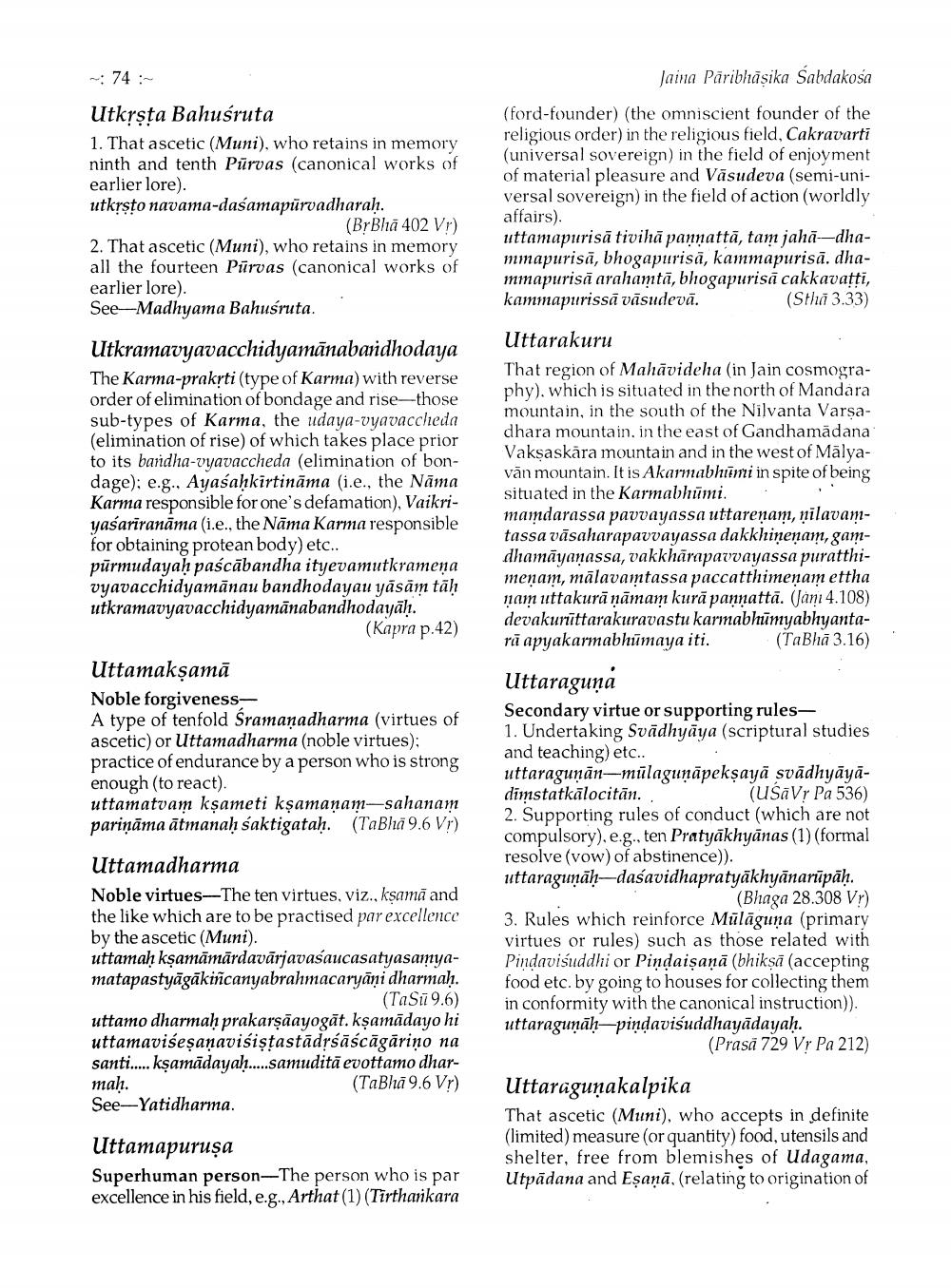________________
Jaina Pāribhāsika Sabdakosa
74 - Utkrsta Bahuśruta 1. That ascetic (Muni), who retains in memory ninth and tenth Pūrvas (canonical works of earlier lore). utkrsto navama-daśamapūrvadharah.
(BrBhā 402 Vr) 2. That ascetic (Muni), who retains in memory all the fourteen Purvas (canonical works of earlier lore) See-Madhyama Bahuśruta.
(ford-founder) (the omniscient founder of the religious order) in the religious field, Cakravarti (universal sovereign) in the field of enjoyment of material pleasure and Väsudeva (semi-universal sovereign) in the field of action (worldly affairs). uttamapurisā tivihā pannattā, tam jahā—dhammapurisā, bhogapurisā, kammapurisā. dhammapurisă arahamtā, bhogapurisă cakkavatti, kammapurissā vasudevā.
(Sthi 3.33)
Utkramavyavacchidyamānabaridhodaya The Karma-prakyti (type of Karma) with reverse order of elimination of bondage and rise-those sub-types of Karma, the udaya-vyavaccheda (elimination of rise) of which takes place prior to its bardha-vyavaccheda (elimination of bondage); e.g., Ayaśaḥkirtināma (i.e., the Nama Karma responsible for one's defamation), Vaikriyasarīranāma (i.e., the Nāma Karma responsible for obtaining protean body) etc.. pūrmudayah paścābandha ityevamutkramena vyavacchidyamānau bandhodayau yāsām tāḥ utkramavyavacchidyamānabandhodayāh.
(Kapra p.42)
Uttarakuru That region of Mahāvideha (in Jain cosmography), which is situated in the north of Mandara mountain, in the south of the Nilvanta Varsadhara mountain. in the east of Gandhamadana Vakşaskāra mountain and in the west of Mālyavan mountain. It is Akarmabhiini in spite of being situated in the Karmabhūmi. mamdarassa pavvayassa uttarenam, nilavamtassa väsaharapavvayassa dakkhiņeņam, gamdhamāyanassa, vakkhārapavvayassa puratthimeņam, mālavamtassa paccatthimenam ettha nam uttakurā ņāmam kurā pannatta. (Jam 4.108) devakuriittarakuravastu karmabhümyabhyantarā apyakarmabhūmaya iti. (Tabhā 3.16)
Uttamaksamā Noble forgivenessA type of tenfold Sramanadharma (virtues of ascetic) or Uttamadharma (noble virtues); practice of endurance by a person who is strong enough (to react). uttamatvam kşameti kşamanam-sahanam pariņāma ātmanah saktigatah. (TaBhä 9.6 VI)
Uttamadharma Noble virtues-The ten virtues, viz., kşamā and the like which are to be practised par excellence by the ascetic (Muni). uttamah kşamāmārdavārjavasaucasatyasamyamatapastyāgākiñcanyabrahmacaryāni dharmah.
(TaSū9.6) uttamo dharmaḥ prakarşāayogāt. kşamādayo hi uttamavićeşaņavisişțastādrśāścāgāriņo na santi..... kşamādayah.....samuditā evottamo dharmaḥ
(TaBhā 9.6 Vr) See-Yatidharma.
Uttaraguņa Secondary virtue or supporting rules1. Undertaking Svādhyāya (scriptural studies and teaching) etc.. uttaraguņān-mülaguņāpekṣayā svādhyāyādimstatkālocitān.
(USãVr Pa 536) 2. Supporting rules of conduct (which are not compulsory), e.g., ten Pratyakhyānas (1) (formal resolve (vow) of abstinence)). uttaraguņāḥ-daśavidhapratyākhyānarūpāḥ.
(Bhaga 28.308 Vr) 3. Rules which reinforce Mülāguna (primary virtues or rules) such as those related with Pindavisuddhi or Pindaişaņā (bhikṣā (accepting food etc. by going to houses for collecting them in conformity with the canonical instruction)). uttaraguņāh-pindavisuddhayādayaḥ.
(Prasa 729 V? Pa 212)
Uttamapuruşa Superhuman person—The person who is par excellence in his field, e.g., Arthat (1) (Tirtharkara
Uttaraguņakalpika That ascetic (Muni), who accepts in definite (limited) measure (or quantity) food, utensils and shelter, free from blemishes of Udagama, Utpādana and Eșaņā, (relating to origination of




